The evil of exorcising judgement
by Kathleen van Schaijik
“Do you not know that the saints will judge the world? And if you are to judge the world, are you not competent to judge trivial cases? Do you not know that we will judge angels? How much more the things of this life?” (I Cor. 6: 2-3)
In her thought-provoking page one article “Women and politics,” Susan Fischer points to the proclivity women have for allowing emotions to displace judgement in their political decision-making. So many seem to bracket out intelligence, and rely on moods to guide the hand that pulls the lever. It’s alarming to contemplate.
And that’s not the only judgment-dropping syndrome afflicting our society. There are others, which, though less obvious, are no less laden with ominous consequences. I am thinking in particular of a kind of intellectual pseudo-sophistication that eschews actual disputes, except maybe insofar as they make for entertaining conversation. It’s an “I’m above the fray” complacency that prides itself on remaining neutral or at least disengaged in the debates of the day.
Worldly people are inclined to this attitude by cynicism. (Nothing is really important; so why expend effort over it?) Christians fall into it for other reasons, including a warped idea of what it means to be “peace makers.” We have been so influenced by pop psychology that many of us are convinced that all disagreements boil down to “miscommunication.” We think we’re doing well if we avoid conflict. And if we come across it in spite of ourselves, we conscientiously suspend judgement and assume that both sides have equally good points in their favor. We imagine we resolve the conflict when we get the disputants to communicate more clearly, listen better, “validate” each other’s concerns, and work out a compromise. No judgement necessary, only technique.
Many people—even university men and women—honestly think they are doing a Christian service when they refrain from asking themselves where truth and right lie in a given dispute, and instead exert themselves to be nice to everybody involved and make sure no one’s feelings get hurt. In reality they are cooperating with a cosmic diabolic strategy to keep Truth from being brought to bear in the world.
Just before the semester started, Ave Maria College hosted a conference titled “Knowledge and Vital Piety: What Athens has to do with Jerusalem.” FUS professor John Crosby gave a talk; so did Fr. James Burtchaell, author of The Dying of the Light, a book about the loss of religious identity at American colleges and universities. Dr. Crosby spoke about a Catholic university’s being the place where the gospel meets the culture; a place where the gospel is brought to bear on the culture. This happens, in large part, by university men and women engaging the questions of the day in the light of their faith. Fr. Burtchaell, too, pointed out that Christianity provides a fund of judgement for us to draw on; a fund we ought to draw on—a set of facts and principles, a vision of reality with consequences extending from the ultimate ends to the minute details of daily living. If we believe what we say we do, then we should realize that it has implications for everything. If we have a proper grasp on what it means to evangelize the world, then we will know it means much more than announcing the good news. Transforming the world in Christ means, too, bringing truth to bear everywhere and in all things, beginning with ourselves and extending as far as our influence can reach.
This is what a Catholic university is all about: building and perfecting our ability to judge rightly. It’s what the Concourse is about too: exercising judgment; taking our understanding—the light of our faith—and rigorously applying it to the situations and difficulties we encounter as we live, through our reading or our relationships, whether in small things, like dorm policies and clothing styles, or in big things, like the justice of capitalism and the genius of women. It’s a genuine contribution toward making our world, as the Holy Father puts it: “more human, reasonable and free.”
The devil sure doesn’t want us to do it. He is just delighted if we get slack in our magisterial capacity; it’ll prevent our being much of a force when it comes time to judge the angels.
Kathleen van Schaijik


